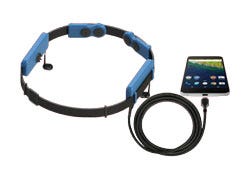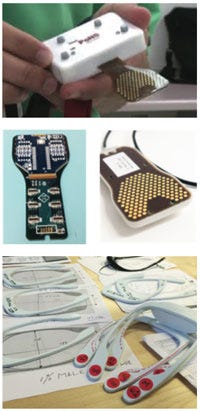Brain State Technologiesvs.Helius Medical Technologies
March 28, 2016
| vs. | ||
|
|
|
|
Describe your device and how it will benefit healthcare. | Post traumatic stress disorder (PTSD) is one of the signature injuries of the Iraq and Afghanistan wars. It is also increasingly recognized in first responders such as police, fire, and paramedical personnel, and it is associated with significant emotional, physical, and social morbidity. The C1 is a wearable, closed-loop, neurotechnology device, driven by a smartphone, that will support the brain to auto-calibrate its activity patterns by reading brain rhythms and using software algorithms to translate dominant frequencies into the medium of sound, in real time. The C1 leverages two important findings about brain function and traumatic stress that may permit it to serve as the first viable intervention for primary prevention of PTSD. First, studies have found that symptoms of insomnia prior to experience of a trauma are a significant risk factor for later development of PTSD. Our pilot data suggest that the C1 is positioned to optimize sleep in individuals in high-stress occupations (military, police, fire, paramedical) by attenuating high frequency amplitudes associated with hyperarousal. Improved sleep should decrease the risk of developing PTSD after a series of stressors or trauma. Second, the cerebral hemispheres have differential roles for management of the autonomic nervous system, with the right and left temporal regions being managers of the sympathetic (fight/flight) and parasympathetic (rest/digest/freeze) divisions, respectively. Pilot data show that the C1 will permit the two sides of the brain to auto-calibrate toward more symmetrical activity patterns, on a regular basis (like a smart car designed to self-align its front wheels). Greater hemispheric symmetry is modeled to reduce the risk for dominant and maladaptive asymmetries that may ensue from stress or trauma, and may contribute to PTSD. |
| The Portable Neuromodulation Stimulator (PoNS) device is an innovative, investigational medical device designed to treat chronic neurological symptoms caused by disease or trauma. The PoNS is currently being studied for the rehabilitation of balance deficits caused by mild to moderate traumatic brain injury (TBI) and for the treatment of gait and balance disorder in patients with multiple sclerosis. The PoNS device delivers a mild electrical stimulation to the surface of the tongue at a rate of approximately 27 million impulses every 20 minutes. This stimulates the facial and trigeminal cranial nerves, which are tied directly to several structures in the brain stem. Researchers believe sustained stimulation of these structures induces neuroplasticity, which results in faster, stronger, and more effective changes in the brain. The personal devastation of TBI--including among military personnel and athletes--has become increasingly well-known and understood in the past two years. Approximately 5.3 million Americans are currently living with a TBI-related injury. Unfortunately, there are currently no effective rehabilitation options for patients suffering from chronic symptoms of brain injuries. Although physical and occupational therapy may be effective in the acute phases of treatment, treatment options are almost non-existent for chronic symptoms. Almost all patients are told they must cope with their symptoms for the remainder of their lives. If approved, the PoNS device--in conjunction with a PoNS therapy program--will create a therapeutic option for individuals with chronic neurological symptoms resulting from brain injury and disease. |
How does your product differ from the competition? | Pharmacological approaches to sleep or stress management may compromise an individual's operational performance, and this side effect can cause problems ranging from the minor to the disastrous. Behavioral solutions to sleep optimization (e.g., sleep hygiene) are difficult to maintain in the high-demand environments associated with military and first-responder job requirements. Data suggest that some behavioral interventions for secondary prevention of PTSD (after trauma occurs) may do more harm than good. There is little or no evidence to suggest that any intervention can be applied effectively for primary prevention of PTSD, other than avoidance of traumatic stress altogether. |
| The PoNS is unique to the neurostimulation space because of how and where it delivers neurostimulation-- the tongue. When combined with targeted rehabilitative therapy, the result is believed to allow for powerful and effective symptom treatment. PoNS is also unique because it allows medical professionals to combine portable, noninvasive neurostimulation with any other typical form of therapy--physical, cognitive, emotional, behavioral, etc. |
Do you have customers yet? | In January 2016, our company released the B2, a high-end version of what will become the C1. The B2 and the C1 operate on the basis of the same closed-loop acoustic stimulation strategy, while using different computing platforms and digital signal processing engines. Specifically, the C1 will have parameters that make it attractive and realistic for use by an entire population of at-risk individuals. The B2 is commercially available now and also intended for controlled evaluations, including a study in health care professionals at risk for burn-out. |
| PoNS is not commercially available yet. It is still in clinical trials.
|
How much money have you raised? | $4 million |
| $17 million |
Who are your investors? | High net-worth individuals, as well as non-dilutive funding from an STTR Phase I award from the US Army Research Office |
| High net-worth individuals as well as institutional and retail investors |
What is the next milestone for your device? | The next milestone for the C1 is to produce working prototypes. |
| We recently announced that a pilot study investigating the safety and effectiveness of the PoNS for the rehabilitation of chronic symptoms caused by multiple sclerosis successfully met its research objectives. We are currently investigating PoNS in an FDA registration trial (i.e., pivotal trial) exploring its safety and effectiveness for the rehabilitation of chronic balance deficits in subjects with mild to moderate traumatic brain injury. This study is sponsored in part by the Department of Defense. We expect to complete this study and submit results to FDA this year. |
You May Also Like






